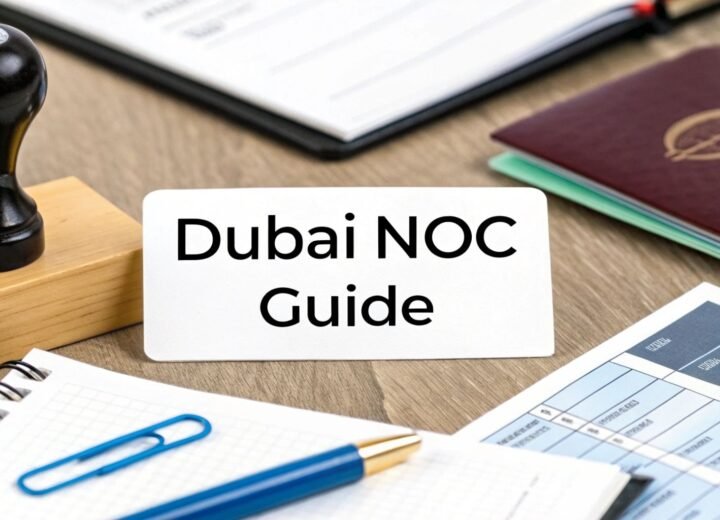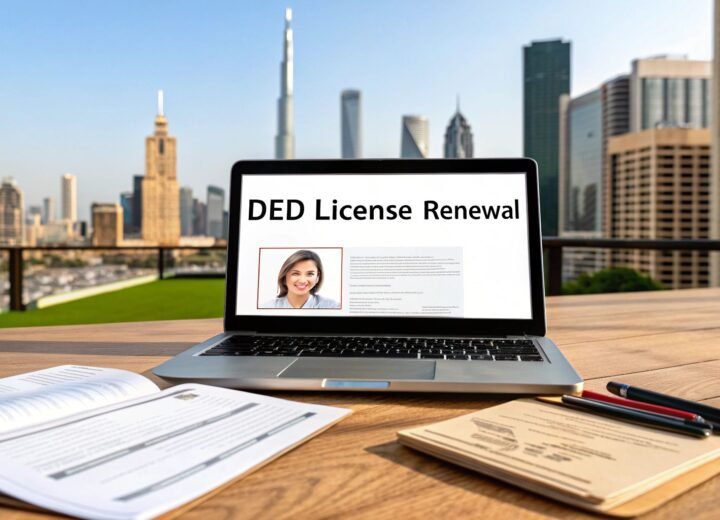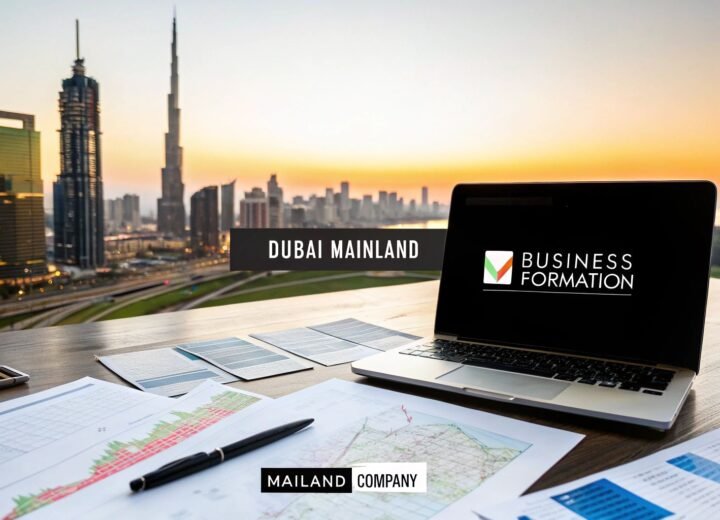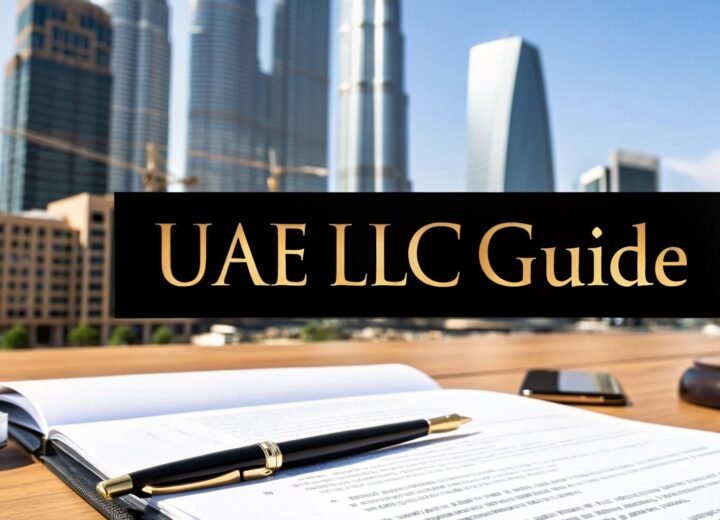So, what exactly is a certificate of incorporation in the UAE? Think of it as your company's official birth certificate. It's the legal document that proves your business has been successfully registered and is now recognised as its own distinct legal entity. This certificate is the foundational key that unlocks all your future commercial activities.
Your Company’s Official Passport to Business
Getting a business off the ground in the UAE is a thrilling journey. But before you can even think about trading, hiring staff, or signing that first big contract, your company needs to be legally ‘born’. The certificate of incorporation is the document that makes it official, turning your brilliant idea into a tangible, government-recognised business.
Frankly, without it, your company simply doesn't exist in the eyes of the law.
This certificate acts as a master key, giving you access to essential business functions. It's the first thing you'll be asked for when you try to:
- Open a corporate bank account.
- Sign commercial contracts and lease agreements.
- Apply for employee visas and other necessary permits.
- Engage with government bodies for tenders and services.
Almost every significant business transaction you make will hinge on having this crucial document. It’s your proof of legitimacy, establishing credibility with clients, investors, and regulatory authorities from day one.
Mainland vs Free Zone: The Issuing Authority Matters
The body that issues your certificate of incorporation is a big deal—it defines your company's operational boundaries and the legal framework you'll operate under. In the UAE, you're generally looking at one of two paths.
Your certificate will be issued either by the Department of Economic Development (DED) for a mainland company or by a specific free zone authority. For years, mainland setups required a local partner, but recent rule changes now allow 100% foreign ownership for a wide range of activities. Free zones, on the other hand, have always guaranteed 100% foreign ownership right from the start, making them a major draw for international entrepreneurs. You can learn more about the nuances of UAE company formation and ownership rules to figure out which is right for you.
A Certificate of Incorporation is more than just a piece of paper; it’s the cornerstone of your company's legal identity. It confirms that you have met all the stringent regulatory requirements, building a foundation of trust and compliance from day one.
Understanding this distinction is the first step in aligning your business setup with your long-term goals. Do you plan to trade directly within the bustling local markets of Dubai and Abu Dhabi? Or will you operate internationally from a specialised free zone? The authority that grants your certificate dictates the rules of the game, influencing everything from your ownership structure and tax obligations to the very scope of your business activities.
Choosing Between a Mainland and Free Zone Company

When you decide to set up a business in the UAE, one of the first and most critical forks in the road you'll encounter is choosing your jurisdiction. This isn't just a box-ticking exercise; it fundamentally shapes your company's future.
The choice is between establishing on the Mainland or within one of the many Free Zones. Each path comes with its own set of rules, benefits, and limitations that will directly impact who you can do business with and how you can operate. Getting this right from day one is essential.
The Mainland Advantage: Your All-Access Pass
Think of a Mainland company as having an all-access pass to the entire UAE economy. Licensed by the Department of Economic Development (DED) in the relevant emirate, these companies have the freedom to trade directly with any business or customer, anywhere in the country.
This is a game-changer if your business needs a physical presence on the ground, like a retail shop, a local marketing agency, or a restaurant. You can set up shop anywhere you like, from a bustling Dubai mall to a quiet street in Sharjah.
Crucially, Mainland companies are the only ones eligible to bid for and work on lucrative government contracts. If your business plan involves collaborating with public sector organisations, then a Mainland setup is your only route. Our team are experts in guiding entrepreneurs through the nuances of Mainland company formation in Dubai and across the other emirates.
The Power of Free Zones: A Global Hub
Free Zones, on the other hand, are special economic areas designed to attract foreign investment with a very compelling package of benefits. With over 40 Free Zones scattered across the UAE, many are tailored to specific industries—think media, tech, finance, or logistics.
The biggest draw? 100% foreign ownership. There's no need for a local partner or sponsor. This, combined with exemptions from corporate and personal income taxes, makes them incredibly appealing for international consultants, e-commerce businesses, and global trading companies.
But there’s a trade-off. A Free Zone company is generally restricted to doing business within its zone or internationally. If you want to sell your products or services directly on the UAE Mainland, you’ll typically need to work through a local distributor or agent.
Choosing your jurisdiction is like picking the right tool for the job. A Mainland setup is a versatile sledgehammer, perfect for breaking into the local market, while a Free Zone is a precision instrument, ideal for specialised international operations.
Real-World Scenarios: Mainland vs Free Zone
Let's ground this in a couple of practical examples to make the choice clearer.
-
Scenario 1: The Local Retail Chain: An entrepreneur wants to open a chain of speciality coffee shops across Dubai and Abu Dhabi. For them, a Mainland licence is non-negotiable. It gives them the freedom to lease retail space anywhere, sell directly to the public, and even bid for contracts to supply government offices.
-
Scenario 2: The International Tech Consultant: A software development firm from Europe needs a regional base to serve clients across the Middle East and Asia. A Free Zone company is the perfect solution. It grants them 100% ownership, makes it simple to hire international talent, and provides significant tax advantages while they operate globally from their UAE hub.
To help you weigh the options, we've broken down the key differences in a simple comparison table.
Mainland vs Free Zone Incorporation At a Glance
The table below offers a straightforward comparison of the most important factors when deciding between a Mainland and Free Zone company.
| Feature | Mainland Company | Free Zone Company |
|---|---|---|
| Ownership Structure | Allows 100% foreign ownership for most activities. | Always offers 100% foreign ownership. |
| Operational Scope | Unrestricted trade anywhere within the UAE and internationally. | Primarily restricted to the Free Zone and international markets. |
| Government Contracts | Eligible to bid on and work with all government entities. | Generally not eligible for direct government contracts. |
| Office Requirements | Requires a physical office space registered with Ejari. | Offers flexible options, including virtual and shared desks. |
| Visa Eligibility | Visa eligibility is typically linked to the size of the office space. | Visa packages are often predefined and not tied to office size. |
| Regulatory Body | Governed by the DED of the specific emirate. | Governed by the authority of the specific Free Zone. |
Ultimately, the best choice depends entirely on your business model and long-term goals. Understanding these core differences is the first step towards a successful launch in the UAE.
Your Step-by-Step Incorporation Process
Getting your business legally recognised in the UAE isn’t some complicated maze. Think of it as a clear, structured journey. If you break it down into manageable stages, you can navigate the path to getting your certificate of incorporation UAE with total confidence. Each step simply builds on the last, giving your new venture a rock-solid legal foundation.
This visual guide breaks down the core journey, showing you how you'll move from initial prep work to getting that final certificate in hand.
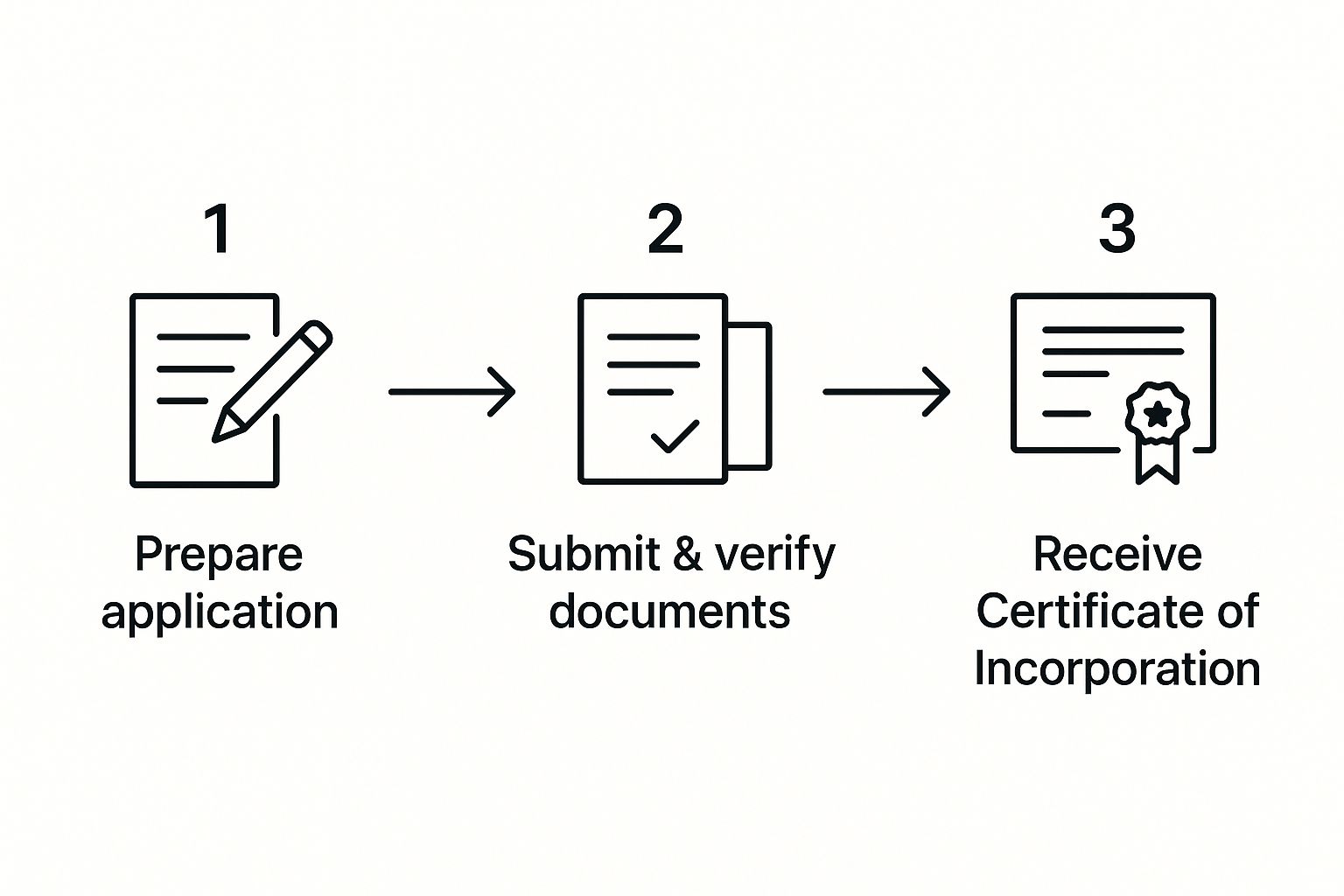
As you can see, it’s a straightforward path. It’s all about diligent preparation, submitting the right documents, and waiting for the official issuance. Success really just comes down to doing things methodically.
Stage 1: Defining Your Business Foundation
Before a single piece of paper is filed, you have to get clear on the core identity of your company. This first stage is all about making two critical decisions that will shape every other step you take.
First up, you need to nail down your business activities. The authorities in the UAE want a very clear statement on what your company will actually do. Whether you're planning to get into e-commerce, consulting, or manufacturing, your activities have to match the approved lists from the Department of Economic Development (DED) or your chosen Free Zone.
Second, you have to pick the right legal structure. You've got options, from a Limited Liability Company (LLC) to a branch of a foreign company. This choice is a big one—it affects everything from your personal liability and ownership structure to how your business is taxed.
Stage 2: Securing Your Corporate Identity
With your activities and legal form sorted, the next job is giving your company a name that's both unique and compliant. This isn't just about branding; it's a strict regulatory hurdle you need to clear.
You'll start by reserving a trade name with the relevant authority. Your chosen name has to follow the UAE’s naming rules—it can't be offensive, go against public morals, or sound too much like another company that's already out there.
Once your name gets the thumbs-up, you'll move on to getting initial approval. This is basically a preliminary green light from the authorities. It signals that they don't have any objections to your business idea and gives you the go-ahead to start pulling together the rest of your documentation.
Stage 3: Drafting Your Legal Blueprint
With initial approvals secured, it's time to draft the legal blueprint for your company: the Memorandum of Association (MoA). This document is incredibly important—it’s essentially your company's internal rulebook.
The MoA lays out all the critical details, such as:
- The business's goals and activities.
- The names of all shareholders and how much of the company they each own.
- The company's share capital structure.
- The rules for how the company will be run and managed.
A well-written MoA is your best defence against future disagreements between shareholders and ensures everyone is on the same page about how things are run. It needs to be carefully prepared and then notarised by a public notary in the UAE to make it legally binding. This is definitely one of those areas where getting professional help can save you from making very expensive mistakes down the line.
Stage 4: Finalising and Submitting Your Application
This is the home stretch. Now you'll gather all your documents, sort out the practical details like your office space, and pull everything together for the final submission.
You'll need an official office address. If you're setting up on the Mainland, this means getting an Ejari (your lease registration certificate). This is a non-negotiable step that proves you have a physical base of operations. Free Zones can be a bit more flexible, but you'll still need to provide proof of an address.
Finally, you submit the whole application package. This will include your initial approval, trade name certificate, notarised MoA, shareholder documents, and your tenancy contract. Once the authorities check that everything is in order and all the fees have been paid, they will issue your official certificate of incorporation UAE.
For a more detailed breakdown, check out our complete guide on how to start a business in the UAE. With this certificate in hand, your company is officially born and ready to get to work.
The Essential Documents for Your Application
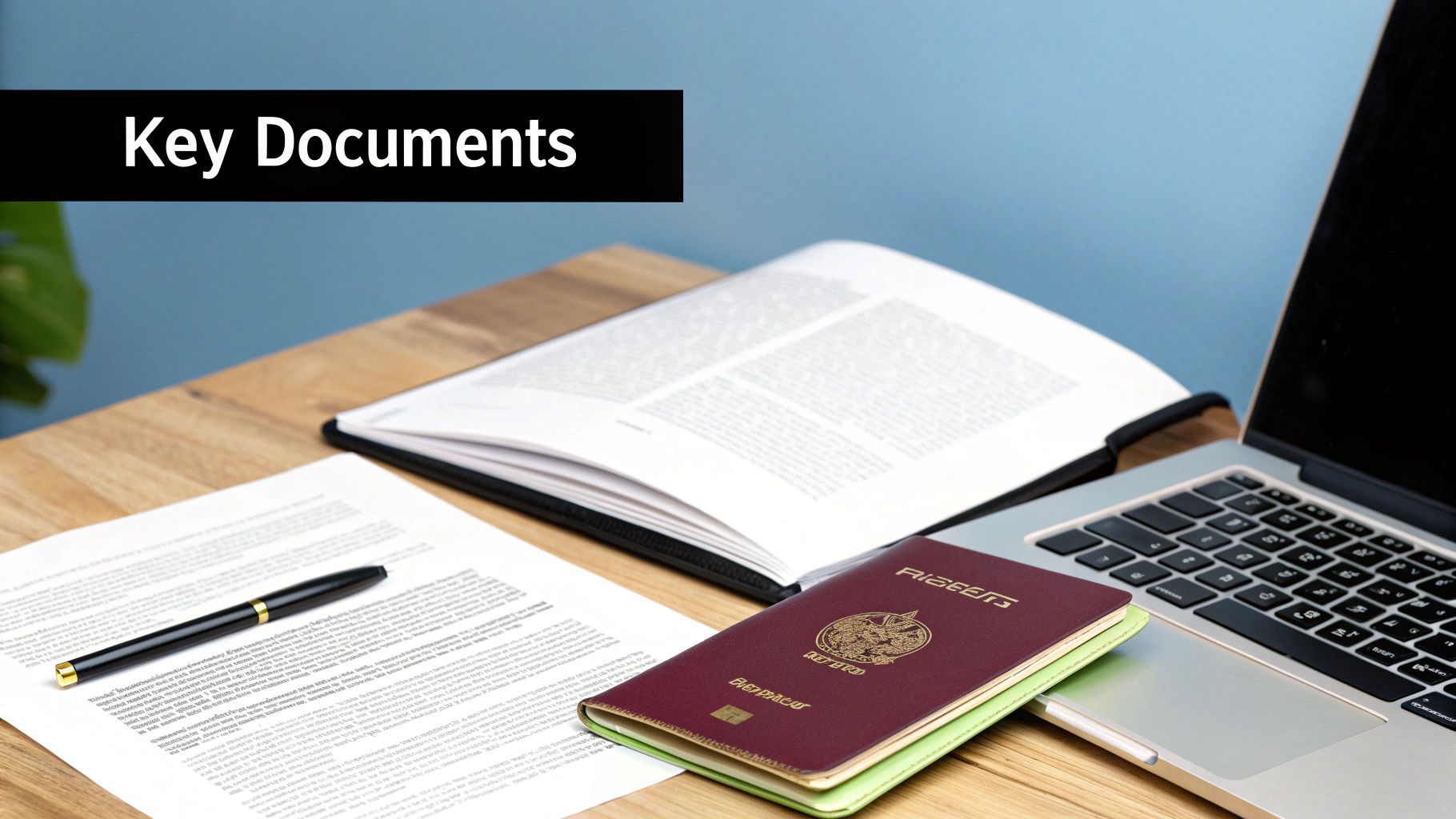
Think of applying for your certificate of incorporation in the UAE like building a high-end watch. Every single document is a crucial gear, and if just one piece is missing or out of place, the whole mechanism grinds to a halt. Getting your paperwork right from the start isn't just a good idea—it's the only way to avoid frustrating delays and potential rejection.
This section is your definitive checklist. We’ll break down everything you need, from personal IDs to the core company paperwork, so you can gather it all correctly the first time. Honestly, this is the single best thing you can do to make the whole process smooth and efficient.
Shareholder and Manager Identification
First things first, the authorities need to know who is behind the business. This means verifying the identities of every shareholder, director, and the general manager you've appointed. It's a standard due diligence step and is absolutely non-negotiable, whether you’re setting up on the Mainland or in a Free Zone.
You'll need to get clear, high-resolution copies of these documents for each person involved:
- Passport Copy: Make sure it’s valid for at least six months from the day you apply.
- UAE Residence Visa and Emirates ID: This is for any shareholder or manager who already lives in the UAE.
- Passport-Sized Photographs: They typically need a plain white background and have to meet specific size rules.
- Entry Stamp or Visit Visa Copy: This applies to non-resident shareholders who are physically in the UAE while the application is being processed.
These documents form the personal bedrock of your application. And if your goal is to secure residency through your new company, it's vital to get the investor visa details right. Our team can walk you through the complete UAE investor visa requirements to ensure there are no surprises.
Foundational Company Documents
Next up are the legal documents that actually define your company. Consider these the architectural blueprints for your business, outlining how it will run, who owns what, and where it’s located.
The core documents you'll need here are:
- Trade Name Reservation Certificate: This is official proof that your chosen business name has been approved and is held for you.
- Initial Approval Certificate: This shows that the relevant authority (like the DED for Mainland or the Free Zone authority) gives a preliminary green light to your business activities.
- Signed Lease Agreement (Ejari): For Mainland companies, you must have proof of a physical office address. Free Zones often have different rules but will still need evidence of a registered address.
- Memorandum of Association (MoA): This is a massive one. It needs to be notarised and lays out the shareholder structure, business goals, and how the company will be governed.
A meticulously prepared Memorandum of Association is more than a formality; it's your company’s constitution. It prevents future disputes by clearly defining shareholder rights and responsibilities from the outset.
Special Cases and Additional Paperwork
Your specific circumstances might call for a few extra documents. For example, if you're currently employed in the UAE and starting this business on the side, you’ll almost certainly need a No Objection Certificate (NOC) from your current sponsor or employer.
Things also get a bit more complex if one of your shareholders is another company. In that case, you’ll need to submit the parent company's own certificate of incorporation, its MoA, and a board resolution approving the new investment. And just a heads-up, all of these will need to be properly attested.
How Incorporation Connects to UAE Corporate Tax
Getting your certificate of incorporation UAE is a huge milestone. It’s the moment your business officially comes to life. But in today's UAE, that piece of paper signifies something more: it’s the starting gun for your journey into the country's corporate tax system.
Think of it less as just a licence to operate and more as a direct link to your new financial responsibilities. The moment your company is incorporated, your very next, non-negotiable step is registering for Corporate Tax with the Federal Tax Authority (FTA). This isn't optional—it's a legal must-do for every business to ensure you're compliant from day one.
Understanding the Corporate Tax Framework
The good news is that the UAE’s corporate tax regime was built to be competitive and surprisingly straightforward. The whole system is designed around a clear threshold, which is a massive help for startups and SMEs just getting off the ground.
As a business owner, these are the two numbers you need to commit to memory:
- A 0% tax rate on taxable profits up to AED 375,000.
- A standard tax rate of 9% on any taxable profits that go above that AED 375,000 threshold.
This two-tiered structure gives new businesses some breathing room to grow and find their footing before any major tax bills arrive. But make no mistake, understanding this framework from the beginning is absolutely essential for proper financial planning and forecasting.
Why Your Incorporation Date Is Critical
Your company's incorporation date isn't just a birthday; it directly dictates your deadlines for corporate tax registration. These timelines aren't random. They are tied to your company's financial year-end, which you establish during the setup process. Miss them, and you could be looking at penalties and other legal headaches.
With the introduction of corporate tax, the certificate of incorporation is now the essential key that unlocks tax registration. In a move to get all businesses integrated into the new system, the Federal Tax Authority has made it mandatory for companies incorporated before March 31, 2024, to register within specific timeframes based on their fiscal year. You can get the full rundown by reading the FTA's official decision on registration timeframes.
Your Certificate of Incorporation is the starting pistol for your corporate tax journey. Understanding your obligations from day one is fundamental to building a sustainable and legally sound business in the UAE's evolving regulatory environment.
Staying Compliant from Day One
Getting compliant is about more than just registering on time. It means keeping meticulous accounting records, knowing exactly what counts as taxable income, and being ready for future tax filings. You have to be proactive.
For international entrepreneurs, the UAE's tax benefits are a massive draw. But to truly take advantage of them, you need to manage your corporate PRO services and finances carefully. By making sure your business setup and tax strategy are aligned right from the start, you build a stable foundation. That way, you can focus on what really matters—growing your business with complete peace of mind.
Why Partnering with an Expert Is Your Best First Step

While you can technically try to navigate the UAE incorporation process on your own, it’s a path riddled with hidden complexities and potential headaches. Working with a specialist turns what could be a frustrating journey into a smooth, successful one, helping you sidestep common—and costly—mistakes right from the start.
Time and again, we see entrepreneurs fall into the same traps. A classic one is picking the wrong jurisdiction for their business model, which can severely limit their operations down the line. Another frequent misstep is submitting incomplete or incorrectly formatted paperwork, a surefire way to guarantee long delays or even an outright rejection. These aren't just minor setbacks; they drain your budget, time, and energy.
Turn Our Expertise into Your Advantage
This is where our deep specialisation becomes your strategic edge. We offer practical, expert guidance that perfectly aligns your business structure with your long-term ambitions, ensuring you’re set up for success from day one.
Our teams are experts across the entire business setup landscape:
- ✅ Specialists in Mainland Company Formation in Dubai, Sharjah & Abu Dhabi
- ✅ Specialists in Freezone Company Formation across the UAE
- ✅ Specialists in Golden Visa on Property and Investor Visa
- ✅ Specialists in Corporate PRO Services and Attestation Services
- ✅ 24/7 Support Service – Always here when you need us
- ✅ Cost-Effective Business Setup Solutions tailored to your needs
- ✅ Enjoy UAE Tax Benefits for International Entrepreneurs
By taking all the complex paperwork and regulatory hurdles off your plate, we free up your most valuable assets: your time and resources. This lets you focus on what you do best—building and growing your business.
A Partnership Built for Your Success
Choosing us means getting more than just a service provider; you get a dedicated partner who is genuinely invested in your success. We handle the intricate paperwork, navigate the local regulatory landscape, and ensure you can take full advantage of all the UAE tax benefits available to international entrepreneurs.
Our entire approach is built on providing cost-effective, customised solutions backed by 24/7 support. We're always here when you need us. Let us take the stress and uncertainty out of getting your certificate of incorporation UAE, so you can focus on a smooth and successful launch.
📞 Call Us Now: +971-54-4710034
💬 WhatsApp Us Today for a Free Consultation
Got Questions? We’ve Got Answers.
As you get closer to the finish line of setting up your business, a few questions always pop up. It’s completely normal. Here, we'll tackle the most common queries about the UAE Certificate of Incorporation with clear, simple answers to give you that final boost of confidence.
How Long Does the Incorporation Process Take?
There's no one-size-fits-all answer, but you might be surprised at how quickly it can happen. If you’ve got all your documents lined up and everything is in perfect order, you could be looking at a turnaround of just one to two weeks.
Of course, the exact timeline hinges on a few things, like whether you’re setting up on the Mainland or in a Free Zone, and how complex your business is. Almost every delay we see comes down to something small, like incomplete paperwork or a trade name that doesn't meet the rules. This is why getting everything right from the start is so important.
Can a Foreigner Get a Certificate of Incorporation?
Yes, absolutely. In fact, the UAE's entire business framework is designed to welcome international entrepreneurs and investors.
Foreign nationals can easily apply for and receive a certificate of incorporation. Better yet, many can enjoy the advantage of 100% ownership, which is a huge draw for those setting up in a Free Zone or in many sectors on the Mainland. As long as you meet the legal requirements and have your documentation sorted, the path is wide open.
The ability for foreign entrepreneurs to fully own their companies is a cornerstone of the UAE's economic vision. The Certificate of Incorporation is the official key that unlocks this opportunity, giving international business owners the same legal footing as locals.
What Is the Difference Between a Trade Licence and an Incorporation Certificate?
It's helpful to think of it this way: your Certificate of Incorporation is like your company's birth certificate. It’s the official proof that your business legally exists as its own entity.
Your Trade Licence, on the other hand, is like its driver's licence. It gives your company the permission it needs to actually do business and carry out specific commercial activities. You'll get the incorporation certificate first, and that's what allows you to then apply for your trade licence and get down to business.
What Happens if I Operate Without This Certificate?
Trying to run a business in the UAE without a valid certificate of incorporation is a very serious misstep. It's not just a minor oversight; it's a major legal violation.
The consequences are severe and can include hefty fines, personal legal action against the owners, and having your operation shut down immediately. Without that certificate, your business doesn't legally exist. This leaves you completely exposed, with no legal protection and facing significant personal liability for everything the business does.
At PRO Deskk, our specialty is making the journey of setting up your UAE business smooth and straightforward. Our experts know the ins and outs of Mainland and Free Zone formation, visa services, and all the corporate PRO solutions you’ll need.
We take care of the red tape so you can pour your energy into growing your business, all with the peace of mind that comes from cost-effective solutions and round-the-clock support. Let us help you secure your Certificate of Incorporation and start building your success story in the UAE.
📞 Call Us Now: +971-54-4710034
💬 WhatsApp Us Today for a Free Consultation at https://prodesk.ae

